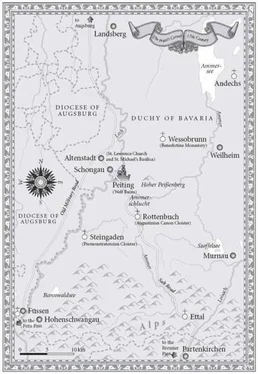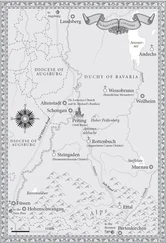Oliver Potzsch - The Hangman’s Daughter
Здесь есть возможность читать онлайн «Oliver Potzsch - The Hangman’s Daughter» весь текст электронной книги совершенно бесплатно (целиком полную версию без сокращений). В некоторых случаях можно слушать аудио, скачать через торрент в формате fb2 и присутствует краткое содержание. Жанр: Исторический детектив, на английском языке. Описание произведения, (предисловие) а так же отзывы посетителей доступны на портале библиотеки ЛибКат.
- Название:The Hangman’s Daughter
- Автор:
- Жанр:
- Год:неизвестен
- ISBN:нет данных
- Рейтинг книги:5 / 5. Голосов: 1
-
Избранное:Добавить в избранное
- Отзывы:
-
Ваша оценка:
- 100
- 1
- 2
- 3
- 4
- 5
The Hangman’s Daughter: краткое содержание, описание и аннотация
Предлагаем к чтению аннотацию, описание, краткое содержание или предисловие (зависит от того, что написал сам автор книги «The Hangman’s Daughter»). Если вы не нашли необходимую информацию о книге — напишите в комментариях, мы постараемся отыскать её.
The Hangman’s Daughter — читать онлайн бесплатно полную книгу (весь текст) целиком
Ниже представлен текст книги, разбитый по страницам. Система сохранения места последней прочитанной страницы, позволяет с удобством читать онлайн бесплатно книгу «The Hangman’s Daughter», без необходимости каждый раз заново искать на чём Вы остановились. Поставьте закладку, и сможете в любой момент перейти на страницу, на которой закончили чтение.
Интервал:
Закладка:
“Father!” he called after him. But the musicians struck up again, and the couples resumed their dancing. Simon looked at Magdalena, who shook her head.
“You shouldn’t have done that,” she said. “He’s your father, after all. My father would have knocked your head off for that.”
“Has everyone here something against me?” Simon mumbled. The brief moment of happiness between himself and Magdalena had evaporated. He turned away and left her standing on the dancing floor. He needed a mug of bock beer.
On his way across to where the beer barrel was set up on its trestles he passed the aldermen’s table. There sat the patricians in cozy familiarity: Semer, Holzhofer, Augustin, and Puchner. The Landgrave had gone over to his soldiers to see if everything was all right. At last the patricians had the opportunity to talk about the coming days and weeks. They anxiously put their heads together and the clerk Johann Lechner sat firm as a rock between them lost in his own thoughts.
Simon stopped and from his position in the shadows observed the scene in front of him.
It reminded him of something.
The four patricians. The clerk. The table…
His head was hot from dancing. The efforts of the previous night still ached in his bones. He had already drunk two mugs of beer at home. He needed a moment before it came to him.
But then he felt as if the last stone of the mosaic had been put into its place.
They had simply not listened properly.
Hesitantly, Simon turned away. The parish priest was sitting alone at a table a little farther back and was observing the dancers. His expression alternated between disapproval and relaxation. As a representative of the church he could not of course approve of this wild, heathen activity. But he was obviously enjoying the warm night, the flickering flames, and the rhythm of the music. Simon went over and sat down beside him, not waiting for an invitation. The priest looked at him in surprise.
“My son, you’re not coming to confession now, are you?” he asked. “Although…as I have just seen, you certainly seem to be in dire need of it.”
Simon shook his head.
“No, Father,” he said. “I need some information. I think I just didn’t listen properly the last time.”
After a short conversation Simon stood up again and returned thoughtfully to the dancers. On the way there he had to pass the aldermen’s table once more. Abruptly he stopped.
One seat was now empty.
Without stopping to think, he hurried to a house at the edge of the marketplace. Behind him the sounds of laughter and music faded. He had heard enough.
Now he must act.
The man sat in a heavy armchair upholstered in velvet and looked out the window. On the table in front of him was a bowl full of walnuts and a jug of water. He could no longer tolerate any other kind of food. It was difficult for him to breathe, and stabs of pain went through his abdomen. He could hear the sounds of the revelry outside, and there was a gap in the drawn curtains through which he could have observed the activity below. But his eyes were going bad, and the fires and dancers all blurred into a misty picture without contours. His hearing, however, was excellent, and so he was aware of footsteps behind him, even when the intruder was endeavoring to enter the room unnoticed.
“I’ve been expecting you, Simon Fronwieser,” he said, without turning around. “You are a nosy little know-it-all. I was against you and your father obtaining burghers’ rights back then, and I have since been proved right. You bring nothing but unrest to our town.”
“Unrest?” Simon no longer took the trouble to be quiet. With quick steps he hurried to the table, while he continued to speak. “Who has brought unrest to this town, then? Who ordered the soldiers to kill small children who had seen too much? Who caused the Stadel to be burned? Who saw to it that fear and hate returned to Schongau and that witches should burn at the stake again?”
He had worked himself up into a rage. With one more step he reached the chair and spun it round toward him. He looked into the blind eyes of the old man, who just shook his head as if he pitied him.
“Simon, Simon,” said Matthias Augustin. “You still haven’t understood. All this happened only because you and that wretched hangman interfered. Believe me, I don’t wish to see any more witches burned. I saw too many people burned at the stake when I was a child. I only wanted the treasure. It belonged to me. Everything else that happened is the responsibility of you two.”
“The treasure, that damned treasure,” Simon muttered as he let himself fall into the chair next to the old man. He was tired, simply tired out. He spoke on, almost as if in a trance.
“The parish priest gave me the decisive clue in the church, but I didn’t understand him correctly. He knew that you were the last one to speak to old Schreevogl before he died. And he told me that you and he were friends.” Simon shook his head before he went on. “When I went to him for confession at that time, I asked him if anyone else had recently shown any interest in the site,” he said. “Until today he had forgotten that you had indeed asked him about it shortly after old Schreevogl’s death. It wasn’t until today, at the May feast, that he suddenly remembered.”
The gray-headed patrician bit his bloodless lip.
“The old fool. I had offered him a lot of money, but no, he just had to build that damned leper house…But the property should have been mine, mine alone! Ferdinand should have left the site to me. It was the least that I expected of the old miser! The very least!”
He took a walnut from the table and cracked it with a practiced hand. Fragments of shell scattered over the tabletop.
“Ferdinand and I had known each other since our childhood. We went to grammar school together, as little boys we played marbles together, and later we had the same girlfriends. He was like a brother…”
“The painting in the council chamber shows you both in the middle of the patricians. A picture of trust and unity,” Simon interrupted him. “I had forgotten about it until I saw you this evening at the table with the other aldermen. In the painting you are holding a paper in your hands. Today I asked myself, what was on it?”
Matthias Augustin’s eyes turned to the light of the flames visible through the open window. He seemed to be looking into the far distance.
“Ferdinand and I were both burgomasters at that time. He needed money, desperately. His stovemaking business was nearly bankrupt. I lent him the money, a considerable sum. The paper in the painting is the receipt. The artist thought I should, as burgomaster, hold a paper in my hand. So I took the receipt, without the others noticing what it was. An eternal witness to Ferdinand’s debt…” The old man laughed.
“And where is the receipt now?” asked Simon.
Matthias Augustin shrugged.
“I burned it. At that time we were both in love with the same woman, Elisabeth, a redheaded angel of a girl. A bit simple perhaps, but of unsurpassable beauty. Ferdinand promised me that he would have nothing more to do with her, and in return I burned the receipt. Then I married this woman. A mistake…”
He shook his head, regretfully. “She bore me a useless, stupid brat and then died during childbirth.”
“Your son, Georg,” Simon interjected.
Matthias Augustin nodded curtly. Then he went on, while his thin gouty fingers twitched.
“The treasure is mine by right! Ferdinand told me about it on his deathbed, and that he had hidden it somewhere on the building site. He told me I would never be able to find it. He wanted to have his revenge. Because of Elisabeth!”
Simon walked around the table. Thoughts rushed through his head in confusion, then came together again in a new pattern. Suddenly it all made sense. He remained standing and pointed to Matthias Augustin.
Читать дальшеИнтервал:
Закладка:
Похожие книги на «The Hangman’s Daughter»
Представляем Вашему вниманию похожие книги на «The Hangman’s Daughter» списком для выбора. Мы отобрали схожую по названию и смыслу литературу в надежде предоставить читателям больше вариантов отыскать новые, интересные, ещё непрочитанные произведения.
Обсуждение, отзывы о книге «The Hangman’s Daughter» и просто собственные мнения читателей. Оставьте ваши комментарии, напишите, что Вы думаете о произведении, его смысле или главных героях. Укажите что конкретно понравилось, а что нет, и почему Вы так считаете.











